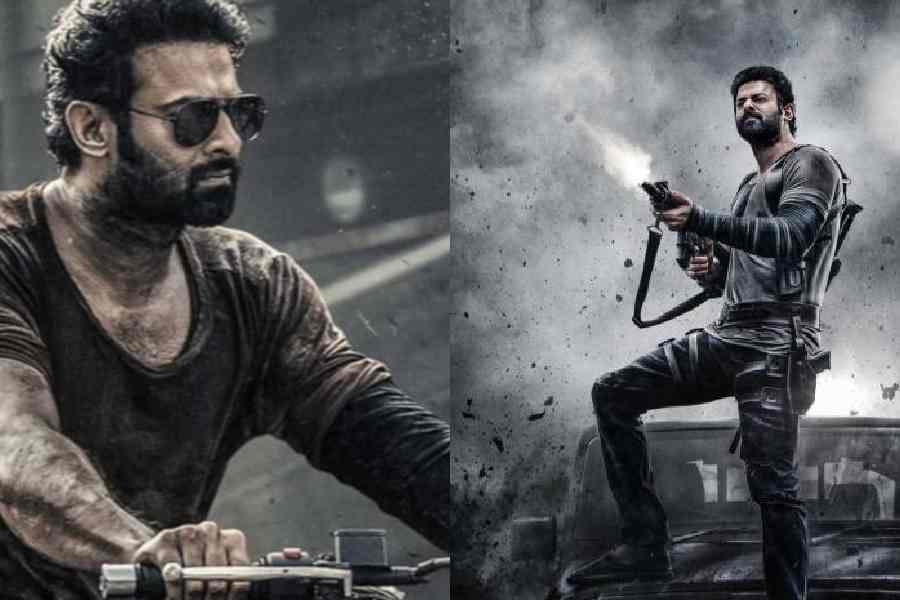Booming into theatres in the aftermath of a season at the movies ruled by violence, violence and more violence, Salaar: Part 1 — Ceasefire is a mass entertainer that provides the right doses of emotion, action, drama and excitement. Directed by Prashanth Neel of KGF fame who collaborates for the first time with superstar Prabhas, this Telugu film dubbed in multiple Indian languages including Hindi, launches the Salaar universe in style. An absolute crowd-puller and a complete action hero by any standards despite his ill luck at the box office of late, Prabhas stars in the titular role in Salaar, that impresses not only with its epic scale and the quiet grandeur of its canvas, but also with its complex, tight-knit plot and a credible storyline that visualises an imagined reality which never seems outrageous or other-worldly.
At the centre of the story is a bromance between childhood friends Vardharaja Mannar (Prithviraj Sukumaran) and Deva (Prabhas), who grow up together in Khansaar, an independent kingdom on the western fringes of Gujarat. Ruled by its own leaders, it is a modern-day tribal nation-state that is self-sufficient, rich, powerful and feared by the rest of the country. But what forms the crux of the narrative that flows back and forth in time, is how the two loyal friends are torn apart before they grow up and the vastly changed circumstances in which they meet again… and then again.
As mentioned by the title of the film, this story merely introduces the premise on which its larger theme rests. But what is special about this origin story is that though it depicts violence and bloodshed, the narrative takes care to point out repeatedly that violence can never be a means to any end. Deva is depicted as an obedient son, a faithful friend, and one who is loved by kids. Though conscious of his incredible power and might, he never uses it for the wrong reasons. Violence is the last resort for him when, as a 10-year-old boy, he goes to defend his friend Vardharaja, and again 25 years later when he has to save his friend’s life. Most importantly, he is shown to make use of his strength when taking down those who try to dishonour women. Deva’s relationship with Aadya (Shruti Haasan), who teaches in a school run by his mother, and who he has to rescue from the baddies, is explored very briefly. More weight is given to the development of his relationship with Vardharaja, with definite hints being given away in the story as to how their bromance will go wrong and the two friends will turn into foes.
In a role reminiscent of his portrayals of Mahendra and Amarendra Bahubali in SS Rajamouli’s mega-blockbuster movies, Prabhas commands an absorbing screen presence. In Salaar too, he is a veritable one-man army, but his action sequences are more subtle and skilful, almost minimalist. The swift, sleek moves with which he despatches his opponents are awe-inspiring, even whistle-worthy, but what stands out is that he always remains human. Deva is a gentleman in combat and that redeems him to a large extent. His violent acts are acts of heroism, valour and courage, necessary to restore justice or protect the vulnerable.
Suspense is one of the pillars of this film, which relies on a masterful storytelling technique to intrigue and excite the audience. This is propelled to a large extent by its expansive narrative that touches on several locations across the country but keeps the mysterious land of Khansaar as its focal point always. Extraordinary cinematography with visually stunning shots of fight sequences and some excellent VFX work add to the depth of the experience. The fight format of Salaar presents an interesting shift from familiar patterns. With all its high-tech, sophisticated artillery and large armies made up of foreign mercenaries, the actual fight sequences are short, uncluttered and understated. In a film full of violence, even the most gruesome sights will not make you shudder in disgust. Visually compelling and loaded with all the ingredients to make it appeal to a mass audience, what makes the experience of watching this film most satisfying is to see the house-full crowd cheering at the right moments.
Piya Roy
Did you like/not like Salaar?
Tell t2@abp.in










